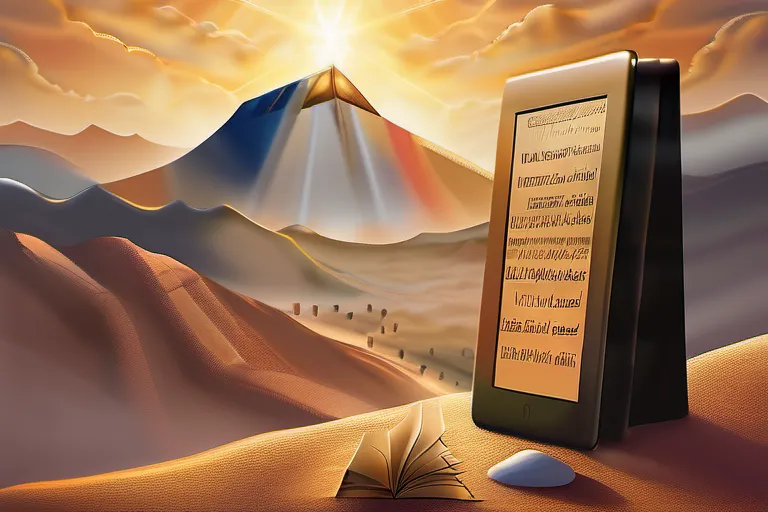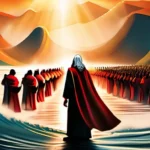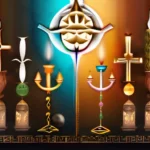Explore the fundamental teachings of Moses, the emergence of monotheism, and its impact on world religions.
Delve into the fascinating world of ancient religion as we explore the core beliefs of Moses and the birth of monotheism. From the Exodus story to the Ten Commandments, uncover the teachings that shaped a new faith and left an indelible mark on humanity.
The Life and Times of Moses
Imagine stepping into the shoes of Moses, the man whose life was intertwined with one of history’s most pivotal shifts towards monotheism. Born in a time when Egypt thrived under Pharaohs, Moses grew up amidst the opulence yet faced the harsh realities of the Jewish slaves. Could it be that this dichotomy shaped his destiny? How did he rise from being a prince to a shepherd and then to a leader who would change the course of faith?
Moses’ life was marked by a series of events that led him to become a figure of profound significance. His first encounter with the burning bush is often seen as a pivotal moment, where he received his calling from the God. Was it not like a beacon in the dark, illuminating a path forward for Moses and, eventually, countless others? The story of the burning bush is more than just an event; it symbolizes transformation and guidance.
In his role as a leader, Moses faced numerous challenges. From leading the Israelites out of Egypt to receiving the Ten Commandments on Mount Sinai, each step was laden with trials and tribulations. How did he manage to keep faith amidst such adversities? His leadership was not just about command but also understanding and empathy. The Exodus, as it’s often referred to, wasn’t merely a physical journey; it was an odyssey of spiritual and moral growth.
The historical context in which Moses lived was one of power dynamics and religious diversity. As the son of a Hebrew mother and an Egyptian father, he straddled two worlds. Could this unique background have given him insights that set him apart? His journey from being a prince to a prophet and then back as a leader who would shape a nation reflects the complexities of leadership and faith.
The life of Moses is a tapestry woven with threads of courage, compassion, and conviction. He embodied the principles of monotheism—unwavering belief in one God—and his story continues to inspire people across different religions and cultures. What can we learn from Moses’ journey? His life teaches us about resilience, faith, and leadership in the face of overwhelming odds.
In this exploration, we see Moses not just as a historical figure but as a symbol of hope and transformation. His story is a reminder that even in the darkest times, there is always light to guide us forward. How do you think Moses’ life influenced your understanding of faith and leadership?
The Exodus Story: From Egypt to the Promised Land
The Exodus story is one of the most iconic narratives in religious history, recounting the journey from slavery to freedom, from oppression to empowerment. Imagine a people trapped like slaves in Egypt, their lives marked by hardship and despair. What would it take for them to break free? The answer comes with Moses, a man who saw a burning bush that was not consumed. This miracle was more than just a sign; it was the beginning of Moses’ transformation into a leader destined to guide his people.
As Moses confronted Pharaoh, he wasn’t just challenging an earthly ruler but symbolically breaking chains of slavery and oppression. The plagues that followed were powerful metaphors for the removal of burdens and the assertion of divine will over worldly might. Each plague was a stark reminder of the power of faith and the unseen hand guiding the Israelites.
The parting of the Red Sea, an event described as “a mighty hand”, not only freed the Israelites but also symbolized their passage from bondage to freedom. It’s a moment when the natural world bends to divine will, a powerful visual metaphor for the liberation that awaited them.
The journey through the wilderness was fraught with challenges, testing both faith and resolve. The Israelites faced shortages of food and water, constant reminders of their dependence on God. Yet, this period also saw the birth of community and the strengthening of bonds, as they learned to rely not just on themselves but on a higher power.
The arrival at the Promised Land was a fulfillment of divine promise, yet it was also fraught with challenges. The Israelites faced new adversaries, representing both external threats and internal struggles of faith and unity. This journey through the wilderness can be seen as a metaphor for spiritual growth and transformation, preparing them not just for physical but for the greater trials ahead.
The Exodus story is more than a historical event; it’s a timeless tale of liberation, hope, and the unwavering commitment to follow a higher calling. It’s a journey that continues to inspire and guide billions around the world, reminding us all of the power of faith in times of adversity.
The Ten Commandments: Foundational Principles
The Ten Commandments stand as the cornerstone of ethical and religious life for millions around the world, particularly within Judaism and Christianity. Have you ever wondered how these simple yet profound rules came to shape our understanding of morality? Let’s delve into their origins and significance.
Imagine a set of guidelines inscribed on stone tablets, handed down by a powerful figure—Moses himself, according to biblical accounts. These commandments are not merely laws; they are a framework for living a life aligned with the divine will. The first four commandments deal with worshiping one God exclusively and maintaining reverence for Him. How can we fully comprehend the depth of monotheism without understanding these foundational principles?
The last six commandments address human conduct: from respecting parents to not coveting another person’s possessions. They serve as a moral compass, guiding individuals on how to coexist harmoniously within their communities. Can you imagine a society where such basic ethics were so clearly defined and enforced?
Moses’ role in delivering these commandments is pivotal. He is often seen as the bridge between the divine and human realms. Through his leadership, he not only led the Israelites out of slavery but also into a new way of thinking—one that emphasized a single, all-powerful God. This shift from polytheism to monotheism was monumental, setting the stage for the development of many subsequent religious traditions.
The Ten Commandments embody principles such as honesty, respect, and love—values that transcend cultural boundaries and time itself. They challenge us to live with integrity, to question our own beliefs, and to seek a deeper connection with something greater than ourselves. In this way, they serve as a timeless reminder of the moral responsibilities we all share.
Reflect on these commandments next time you face a dilemma. How do they influence your decisions? What does it mean to honor God above all else in today’s world?
Monotheism’s Emergence: From Polytheism to a Single God
Imagine stepping back in time to ancient Egypt, where the land was filled with countless gods and goddesses, each believed to govern different aspects of life—sunrise, storms, harvests, and more. It was a world teeming with deities, where people sought favor through prayers, offerings, and rituals. But what if someone emerged, claiming to speak directly to one god? This person, Moses, challenged the polytheistic beliefs that had shaped Egyptian society for centuries. Wasn’t this akin to asking an entire civilization to see the world with just one lens?
Moses’ journey began not as a revolutionary, but as a prince of Egypt, sheltered from the harsh realities outside his palace walls. However, his life took a dramatic turn when he witnessed the injustices faced by his fellow Hebrews. Could it be that this pivotal moment set the stage for monotheism? As Moses wandered in Midian, tending flocks and contemplating the world around him, something profound began to take shape within him—a singular vision of a single, powerful God.
The emergence of monotheism was not merely a shift from many gods to one; it was a transformation that demanded a new way of thinking. This new faith required people to trust in a single, all-powerful deity who could be approached through a personal relationship rather than through intermediaries like priests or temples. Wasn’t this a radical idea that challenged the very fabric of society’s religious practices?
Moses’ teachings emphasized the uniqueness and supremacy of God. He spoke of God as the one who created the heavens and the earth, the one who heard the cries of his people and delivered them from slavery. These concepts were revolutionary because they proposed that there was no room for multiple gods or deities in this new belief system. Instead, it introduced a concept where God was seen as an omnipotent, omniscient, and loving presence who demanded loyalty and obedience.
The journey from polytheism to monotheism was not just about changing beliefs but also transforming societal structures. It required a shift in how people understood their role in the world and their relationship with God. This new faith became more than just religious; it became a way of life, influencing every aspect of existence—morality, ethics, and even social justice.
The Influence of Moses and Monotheism on World Religions
How did Moses and his teachings shape the world as we know it today? The influence of Moses and monotheism on religions such as Christianity and Islam cannot be overstated. Just imagine if Moses had not received the commandments or if he hadn’t led the Israelites out of Egypt – would our understanding of God and morality have evolved in the same way?
Moses is often referred to as the lawgiver, but his teachings went far beyond legal codes. The ten commandments, for instance, laid down principles that resonate with humanity’s ethical struggles even today. These commandments are like a compass guiding people towards justice and compassion. Could it be that without Moses, society might have remained adrift in the moral wilderness?
In exploring how monotheism emerged from polytheistic beliefs, one can see the dramatic shift in perspective that occurred with the advent of Moses’ teachings. The idea of a single, all-powerful God who commands love and respect is a radical concept. It’s as if the heavens had collapsed into a single point, forcing people to reconsider their relationship with the divine.
Christianity adopted much from Moses’ teachings but also expanded upon them. The figure of Jesus Christ, in many ways, can be seen as an extension of the prophetic role of Moses. Christians see Jesus as both Moses and the new covenant, bridging the old law with a more divine grace. This transformation is akin to reshaping clay into a new form – the original blueprint remains but is now enriched and reimagined.
In Islam, too, Moses holds a significant place. The story of Moses and Pharaoh is recounted in the Quran as a tale of divine intervention and deliverance. It’s like reading an epic saga where God intervenes to set his chosen people free from oppression. This narrative reinforces the idea that history is not just a sequence of events but a series of divine revelations.
The teachings of Moses and the emergence of monotheism have undeniably shaped these religions, creating a foundational framework for belief and practice. As we delve deeper into how these beliefs have influenced modern society, it becomes clear that the legacy of Moses and monotheism is far more than just ancient history; it’s a living, breathing part of our collective consciousness.
The Legacy of Moses and Monotheism Today
Understanding the Legacy of Moses and Monotheism Today:
Have you ever wondered how the teachings of Moses, a man who walked among ancient stones and whispered to fiery clouds, still resonate in our modern world? As we explore the ongoing impact of his teachings and the emergence of monotheism on society today, it’s like peeling back layers of history to reveal the core beliefs that continue to shape us.
Imagine a vast garden where different paths lead to the same destination. Each path represents a religious tradition, but at their roots, many find themselves tracing back to the teachings of Moses and his monotheistic vision. In this garden, every flower seems to have been watered by the rivers of Exodus, Passover, and Ten Commandments. These stories are not just tales of old; they are living waters that continue to nourish faiths across the globe.
Consider how these teachings influence modern ethics and morality. The idea of a single, all-powerful God who demands justice and mercy is woven into the fabric of our legal systems and moral codes. Could it be that the principles of loving thy neighbor or treating others with fairness have their origins in the commandments given to Moses? These teachings are like a beacon guiding humanity towards a more compassionate and just society.
Moving beyond religion, monotheism has also influenced art, literature, and even science. The metaphor of one God can be seen as a unifying force that brings together diverse cultures and peoples under the umbrella of shared values. In today’s interconnected world, this idea serves as a reminder to embrace unity in diversity.
But how do these ancient teachings apply to our modern challenges? Are we still grappling with the same issues Moses faced: the struggle for freedom, the quest for justice, and the search for meaning in a complex world? As we navigate through contemporary issues such as inequality, environmental degradation, and technological advancements, might there be lessons from Moses that could guide us?
Reflect on your own beliefs. Do you see echoes of Moses’ teachings influencing your actions or attitudes towards others? Perhaps the legacy of monotheism is not just about adhering to a set of rules but also about embodying the values it promotes—compassion, justice, and love.
The journey of understanding Moses and monotheism today is a continuous one. As we walk through this garden, let us remember that each step forward in our quest for knowledge and understanding can lead us closer to the wisdom taught by Moses and his enduring legacy.
Conclusion
 In this enlightening article, we’ve examined the foundational beliefs of Moses and the emergence of monotheism. By understanding these core principles, we gain insight into the origins of one of the world’s major religions and its lasting impact on human history.
In this enlightening article, we’ve examined the foundational beliefs of Moses and the emergence of monotheism. By understanding these core principles, we gain insight into the origins of one of the world’s major religions and its lasting impact on human history.











